FINAL PROGRAM
Below are printable PDFs of the sections of the final program booklet:- Cover, table of contents, program at a glance, conference information, schedule of ISSOTL Interest Group and committee meetings, etc
- Details of Wednesday & Thursday
- Details of Friday
- Details of Saturday
 In addition to the downloadable PDFs above, the Guidebook mobile app will provide the most up-to-date information about the conference, including schedules, maps, and much more. Download and open Guidebook, then search for “ISSOTL 2017.” You can also view it online.
Click here or the image below to see the Program at a Glance.
In addition to the downloadable PDFs above, the Guidebook mobile app will provide the most up-to-date information about the conference, including schedules, maps, and much more. Download and open Guidebook, then search for “ISSOTL 2017.” You can also view it online.
Click here or the image below to see the Program at a Glance. 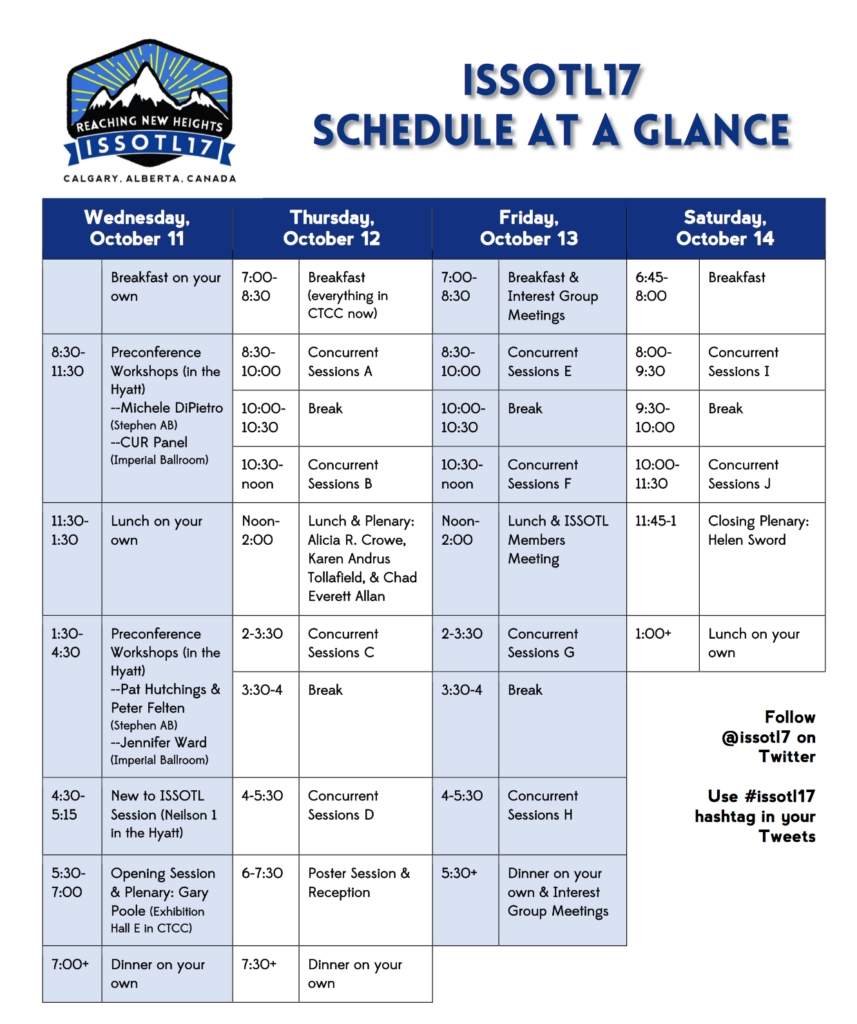
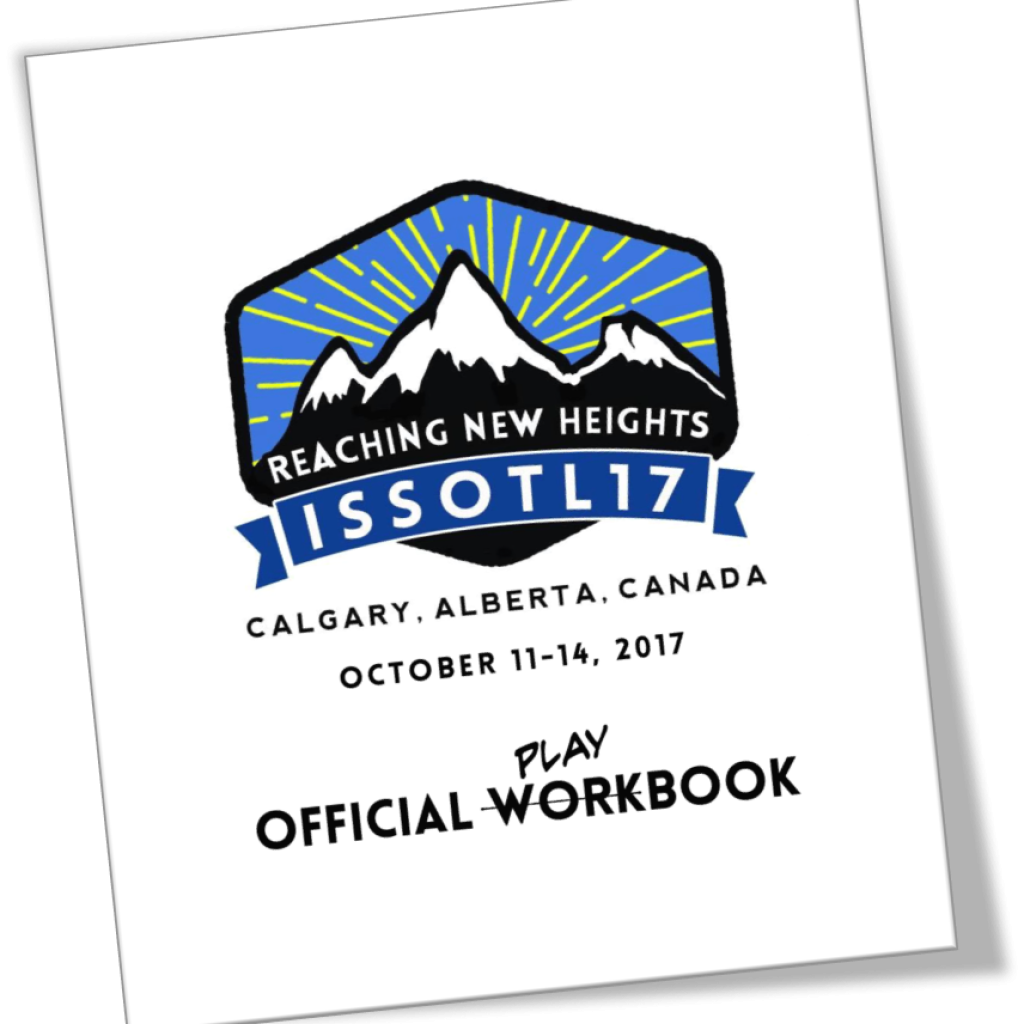
CHRONICLE YOUR EXPERIENCE IN THE ISSOTL17 WORK/PLAYBOOK
Download the ISSOTL17 PLENARIES
Opening Plenary “Reaching for New Heights: Who Gets to Reach?” by Gary Poole [Watch the video]
More than any other academic endeavor I have pursued, the scholarship of teaching and learning (SoTL) concerns itself with who does the work as much as the nature of the work itself. I have come to believe that it is this “who question” that most clearly separates SoTL from other educational research. The “who question”, then, is central to the essence of SoTL, and it has invited some of the field’s most compelling metaphors—the big tent, the campground, and disciplinary walls, to name a few.
Ultimately, the “who question” motivates us to maintain a focus on inclusion, and I believe we can be proud of what that focus yields. Recent discussions of students’ roles in SoTL are just one example of the good that can come from caring about inclusion.
In this session, we will look at how inclusion is facilitated and inhibited in SoTL. We will look at work investigating the role that peer review plays in the shaping of patterns of inclusion (and exclusion) and the building of a SoTL culture. We will also look at some of the ongoing challenges inherent in forging a culture that values inclusion as we do in SoTL.
Gary Poole is a professor emeritus in the School of Population and Public Health in the Faculty of Medicine and Senior Scholar in the Centre for Health Education Scholarship at the University of British Columbia. For 10 years, he was the director of UBC’s Centre for Teaching and Academic Growth and the founding Director of the Institute for the Scholarship of Teaching and Learning. He is a past-president of the Society for Teaching and Learning in Higher Education (STLHE) and of the International Society for the Scholarship of Teaching and Learning (ISSOTL). He has received career achievement awards from both societies. He is also a 3M National Teaching Fellow. With Nancy Chick, Gary co-edits ISSOTL’s journal, Teaching & Learning Inquiry. With his family, he chases after his 4 young grandsons.
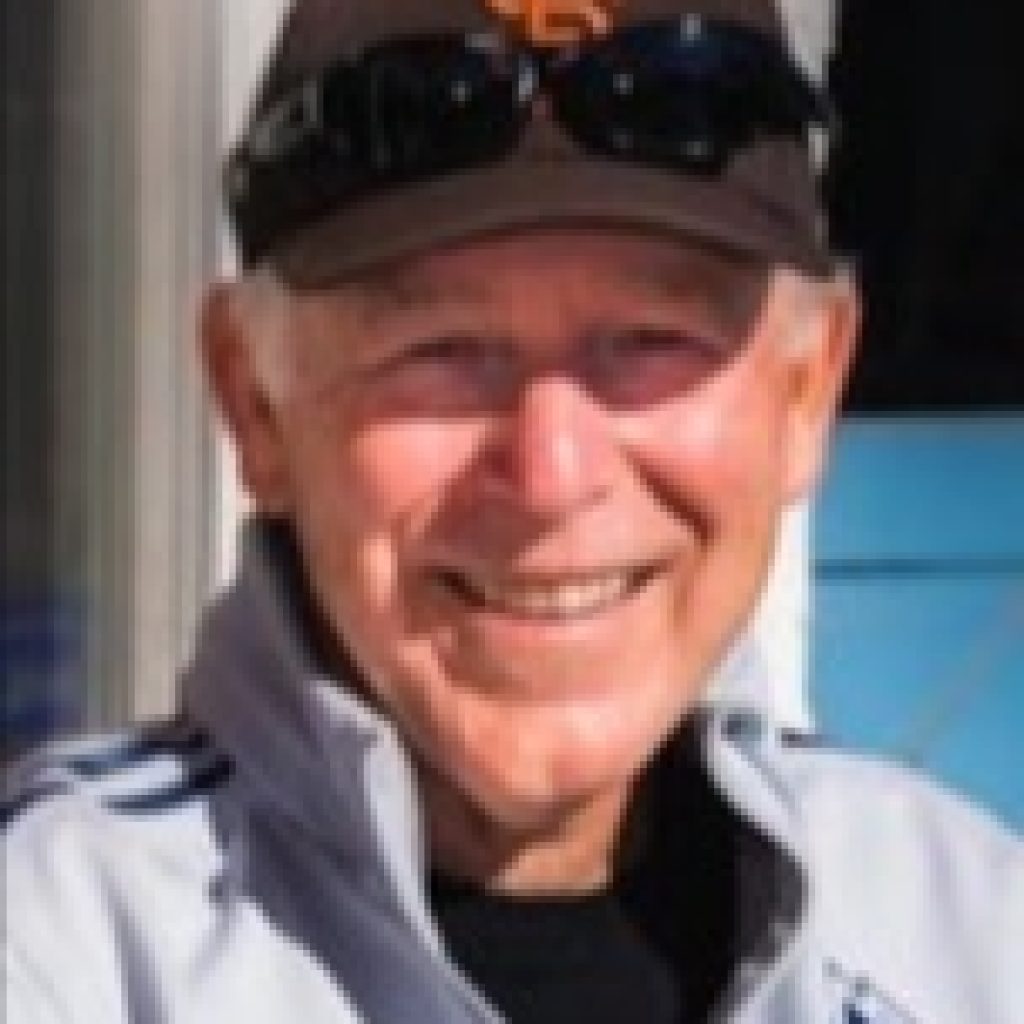
Thursday Plenary “Ch-Ch-Ch-Ch-Changes: Using Self-Study to Engage Students in Studying Teaching and Learning” by Rachel Foot, Alicia R. Crowe, Karen Andrus Tollafield, and Chad Everett Allan [Watch the video]
Like the lyrics of David Bowie’s famous song, academia and the doctoral journey involve a multitude of complex identity changes and transitions. In 2014, we partnered with our supervisor to undertake a self-study of our emerging identities as doctoral student practitioners and supervisor. That experience provided us with space to reflect as individuals while also connecting with peers about our experiences. Since then, all of our academic lives and identities have evolved and developed, but this self-study experience remains an important milestone in our academic work and development as researchers.
In this session, we will discuss our experiences as doctoral researchers collaborating on our first self-study and share how it shaped our work and lives in academia, as well as how our identities changed and developed as a result of this research experience. We will also propose practical steps for using self-study to engage students at all levels in the scholarship of teaching and learning and recommend ways self-study can be specifically used to empower doctoral students to reach new heights as active researchers and scholars.
Rachel Foot is a PhD Candidate of Curriculum & Instruction, an online instructor, and an Instructional Designer at Kent State University (USA). Originally from Bristol in the UK, Rachel completed her graduate studies in the USA where she became interested in adult education and exploring the ways we can provide the highest quality of education to students in higher education institutions. Rachel’s research interests intersect around three main themes: curriculum issues in higher education, adult student experiences of higher education, and the retention and socialization of doctoral students. She has published articles related to the benefits of self-study in doctoral education and various classroom strategies for enhancing the student experience in higher education.
Alicia R. Crowe is a Professor of Social Studies Education and Teacher Education in the School of Teaching, Learning, and Curriculum Studies at Kent State University (USA). She is currently the Associate Dean of Undergraduate Student Services and Director of Teacher Education. Her areas of interest and research include teacher education, social studies education, teacher learning, self-study methodology, and technology in social studies education. She is passionate about teaching and strengthening the study of one’s own teaching through self-study. Her edited book, Advancing Social Studies Education through Self-Study Methodology, was designed to introduce more social studies educators to self-study methodology and challenge them to use the methodology to better understand and enhance social studies teacher education.
Karen Andrus Tollafield is a retired teacher with 30 years experience in the elementary and middle school classroom. She recently received her Ph.D. in Curriculum & Instruction/Literacy from Kent State University (USA) studying the expressive outlets for LGBTQ young adults during their K-12 schooling and beyond. Furthering her work as an Ally (supporter for the equality of LGBTQ rights), Karen serves as the LGBTQ Liaison for the Ohio Council of Teachers of English Language Arts and works with GLSEN NEO (Gay Lesbian Straight Education Network NE Ohio) as a Safe Schools Trainer and Youth Programs Coordinator.
Chad Everett Allan is an adjunct instructor at Temple University in the College of Education’s Department of Teaching and Learning and in Dissertation II at Kent State University (USA) in Curriculum and Instruction. After teaching Spanish for 15 years at the secondary level, he taught 6 years in the Department of Modern and Classical Languages at Kent State University, where he was also a supervisor for student teachers in Spanish. He is currently a Chief Scoring Leader for ETS, working with SAT, AP, and Praxis exams, among others. His passion is for the classroom, assessment and evaluation, and teaching studies. His accolades include Spanish Teacher of the Year (2006) as well as the recipient of several national and international fellowships and scholarships. Outside the classroom, he enjoys tennis, traveling, and art.

Closing Plenary “Writing to the Heights and From the Heart” by Helen Sword [Watch the video]
How do we as educators, Indigenous and non-Indigenous, work together to create an engaging learning environment for Indigenous and non-Indigenous students? How do we reflect on our attempts to do so? In this workshop we will engage with Indigenous ways of knowing, being, doing and researching as a model for decolonizing education. Indigenous knowledge is naturally community based, holistic, and relationship orientated. Using SoTL principles and Indigenous methodologies as the lenses through which we view and reflect on our practice, we will explore strategies for Indigenizing courses and creating a space that is respectful to Indigenous peoples’ historical and contemporary realities.
Helen Sword is Professor and Director of the Centre for Learning and Research in Higher Education at the University of Auckland, where she received the 2007 Teaching Excellence Award for Innovation in Teaching and the 2013 HERDSA-TERNZ medal for researchers who have made a major impact on the tertiary education research environment in New Zealand. Trained as a literary scholar, she has published widely on modernist literature, digital poetics, higher education teaching and academic writing, including six books, numerous scholarly articles, and invited commentaries in international publications such as the New York Times, the Wall Street Journal, the Chronicle of Higher Education, and the Times Higher Education Supplement. Her recent books include Stylish Academic Writing (Harvard 2012), The Writer’s Diet (Chicago 2016), and Air & Light & Time & Space: How Successful Academics Write (Harvard 2017). For links to her online Writing BASE (behavioural, academic, social, and emotional dimensions of academic writing) and Writer’s Diet Test (“Is your writing flabby or fit?”) and see her website at www.helensword.com.
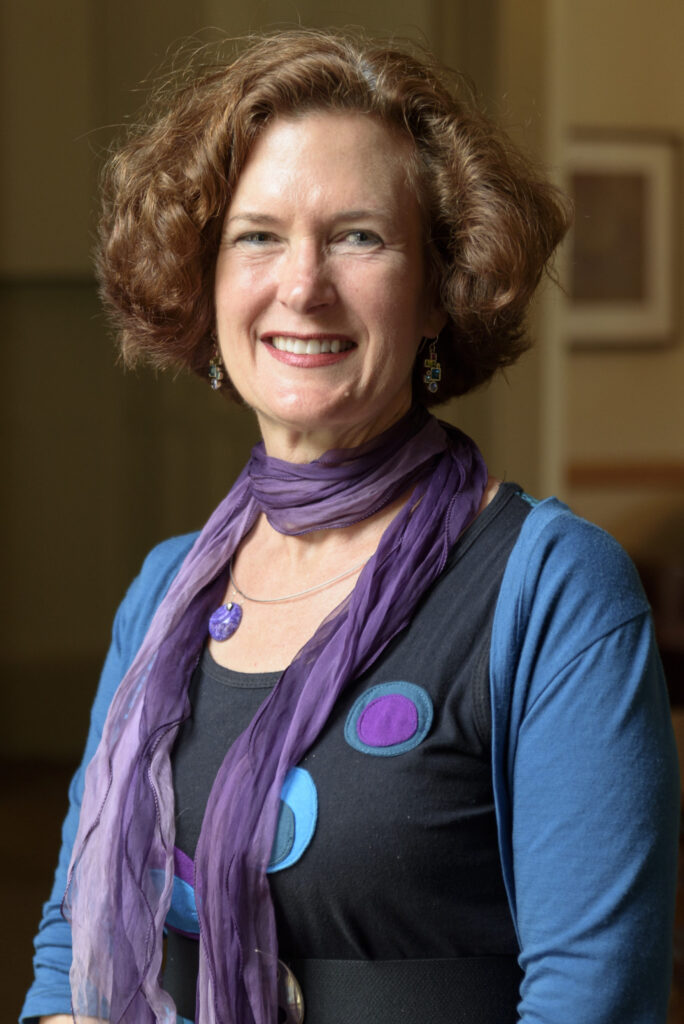
PRE-CONFERENCE WORKSHOPS
Each preconference workshop has limited space, so register at your earliest convenience. ISSOTL members may register for one preconference workshop free of charge. They may register for a second preconference workshop for $50. Non-members may register for preconference workshops for $50 each.
“How Learning Works: Seven Research-Based Principles for Smart Teaching” Facilitated by Michele DiPietro
A tenet of learner-centered teaching is that learning is the litmus test of any pedagogy. Therefore, one of the most important investments we as educators and as SoTL practitioners can make is to understand the learning process so that our teaching and our scholarship are grounded in it. In this workshop we will synthesize 50 years of research on learning from the cognitive, metacognitive, motivational, developmental, and inclusiveness perspectives into seven integrated principles. This interactive workshop will illustrate the seven principles with demonstrations, discussions, and other activities that highlight how each of the principles might enhance participants’ teaching and SoTL practice
Dr. Michele DiPietro is the Executive Director of the Center for Excellence in Teaching and Learning and a Professor in the Department of Statistics and Analytical Sciences at Kennesaw State University. He is also a former President of the Professional and Organizational Development (POD) Network in Higher Education, the premiere faculty development association in North America, and a Board Member of the International Consortium for Educational Development (ICED). With his former Carnegie Mellon colleagues, Dr. DiPietro is a co-author of How Learning Works: 7 Research-Based Principles for Smart Teaching. The book was listed at #3 in a “Top 10 Books on Teaching” list on the Chronicle of Higher Education. His scholarly interests include learning sciences, academic integrity, diversity and inclusion, the Millennial generation, statistics education, the consultation process in faculty development, and teaching in times of tragedy. He has presented dozens of workshops and keynotes at numerous colleges and conferences, in the US and abroad, and some of his scholarship has been translated into foreign languages (Chinese, Hebrew, Italian, Japanese, Korean, and–forthcoming–Spanish). He won the POD Innovation award for the online consultation tool “Solve a Teaching Problem.” His innovative course “The statistics of sexual orientation” has been featured on the Chronicle of Higher Education and several other magazines. Dr. DiPietro is the 2015 recipient of the Bob Pierleoni Spirit of POD award, the highest honor bestowed in the field of educational development for professional achievement and legacy to the field.
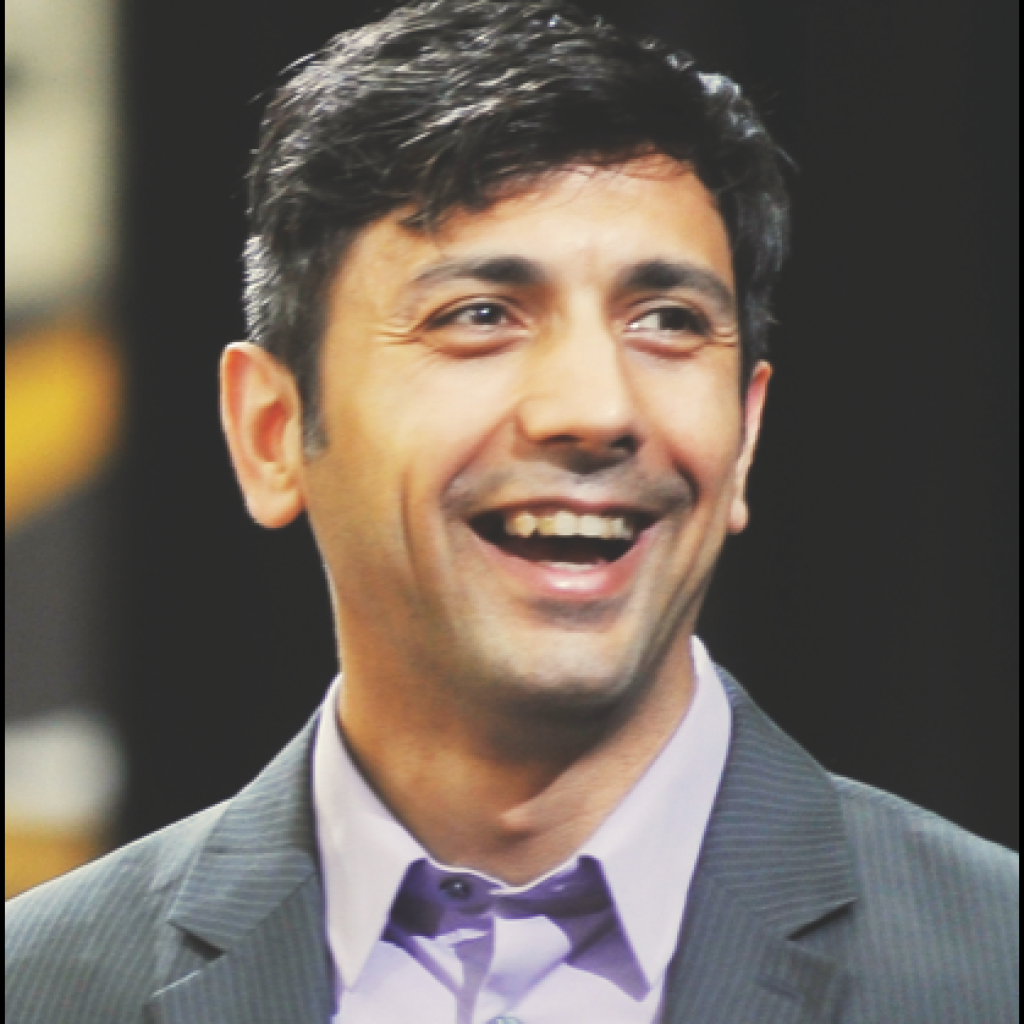
“Openings and Opportunities: Making a Place for the Scholarship of Teaching and Learning in Your World“
Facilitated by Pat Hutchings and Peter Felten
Few faculty have formal preparation for work as scholars of teaching and learning, but the field has now progressed sufficiently to provide many models for meaningful engagement. This workshop will explore the range of purposes and practices that can characterize consequential inquiry into the work we do with our students. Though not strictly speaking a “how to” workshop, nor a primer in methodology, this session will consider different “openings and opportunities” that can help you get started or build momentum in SoTL in ways that can advance your own interests, contexts, and aspirations. Our intent is to ensure that you leave the workshop with a plan for concrete action informed by a broad array of resources available to ISSOTL members.
Download their Powerpoint presentation and their handout.
Pat Hutchings is a senior scholar with the National Institute for Learning Outcomes Assessment (NILOA). Her work has focused on a variety of strategies for creating a campus culture of teaching and learning: student learning outcomes assessment, integrative learning, the peer collaboration and review of teaching, and the scholarship of teaching and learning. Recent publications include The Scholarship of Teaching and Learning Reconsidered: Institutional Integration and Impact, co-authored with Mary Taylor Huber and Anthony Ciccone (2011); and, as part of the NILOA team, Using Evidence of Student Learning to Improve Higher Education (2015). Previously she was vice president at the Carnegie Foundation for the Advancement of Teaching, where she was part of the leadership team for the Carnegie Academy for the Scholarship of Teaching and Learning (CASTL).
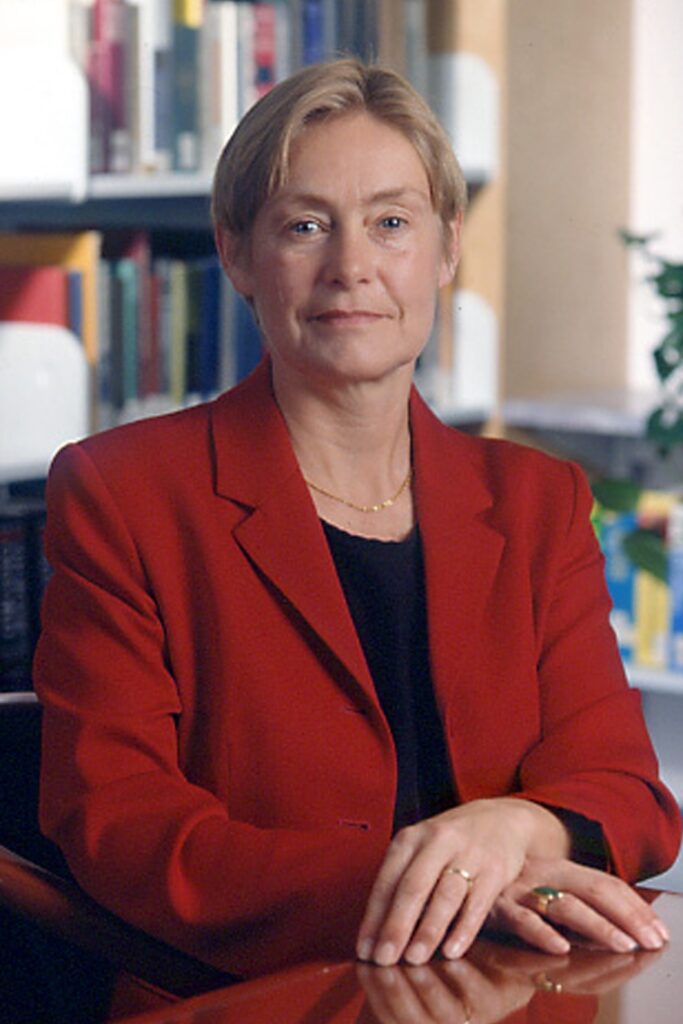
Peter Felten is assistant provost for teaching and learning, executive director of the Center for Engaged Learning, and professor of history at Elon University (US). His publications include the co-authored books The Undergraduate Experience (2016) and Engaging Students as Partners in Learning and Teaching (2014), and the co-edited Intersectionality in Action (2016). He is president (2016-17) of the International Society for the Scholarship of Teaching and Learning, and co-editor of the International Journal for Academic Development.
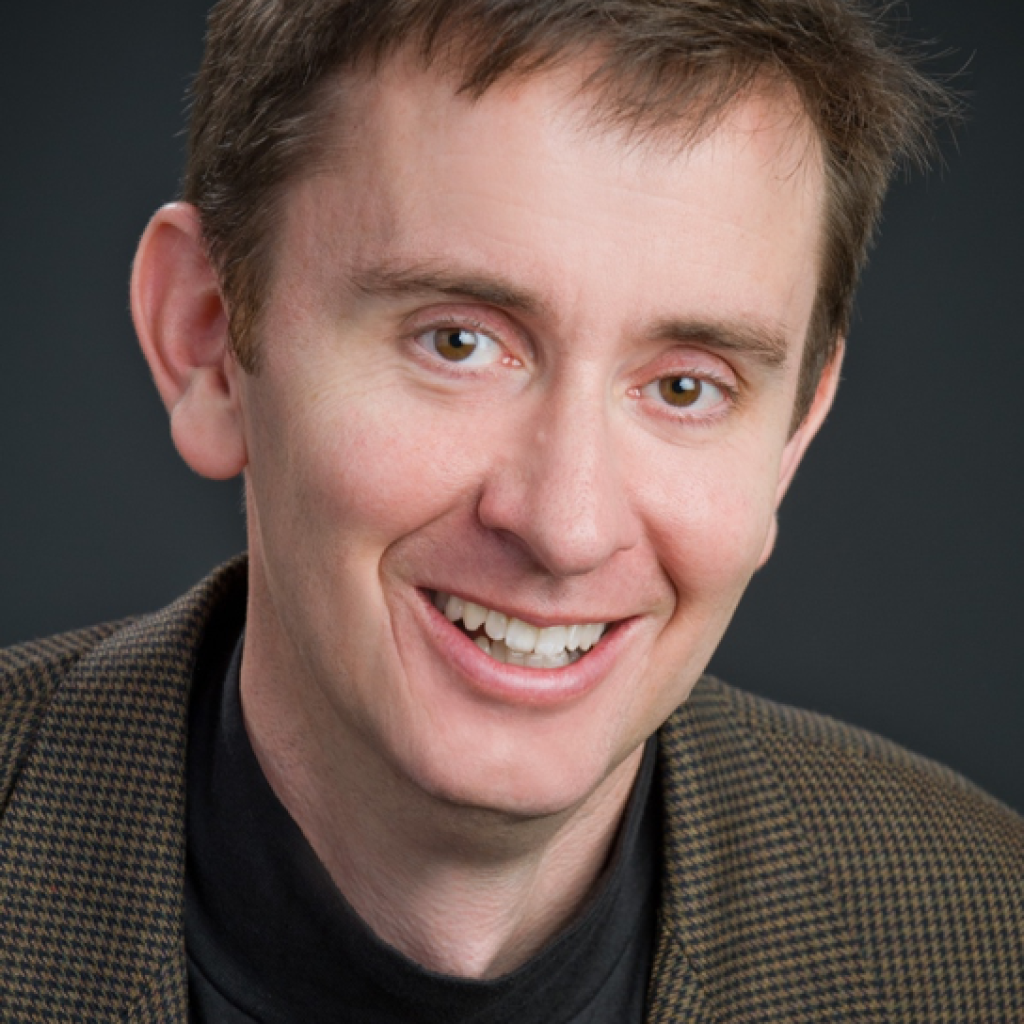
“Living Within the Circle: Decolonizing Education“
Facilitated by Jennifer Ward
How do we as educators, Indigenous and non-Indigenous, work together to create an engaging learning environment for Indigenous and non-Indigenous students? How do we reflect on our attempts to do so? In this workshop we will engage with Indigenous ways of knowing, being, doing and researching as a model for decolonizing education. Indigenous knowledge is naturally community based, holistic, and relationship orientated. Using SoTL principles and Indigenous methodologies as the lenses through which we view and reflect on our practice, we will explore strategies for Indigenizing courses and creating a space that is respectful to Indigenous peoples’ historical and contemporary realities.
Jennifer Ward (MA, Athabasca University) is of Umpqua and Algonquin ancestry. She has ten years experience as an English Instructor at the Northern Alberta Institute of Technology (NAIT), as well as two years experience as a Consultant in the First Nations, Métis, and Inuit Education unit with Edmonton Public Schools (EPSB). The use of Indigenous epistemologies and pedagogies in education and training staff are the foundational principles of her master’s thesis and the work she did with EPSB and the Government of Alberta. She has designed both face-to-face and on-line courses. She was short-listed for a student nominated Instructional Excellence Award in 2014. Working with Elders, students and community are some of her most cherished experiences. Hiy Hiy.
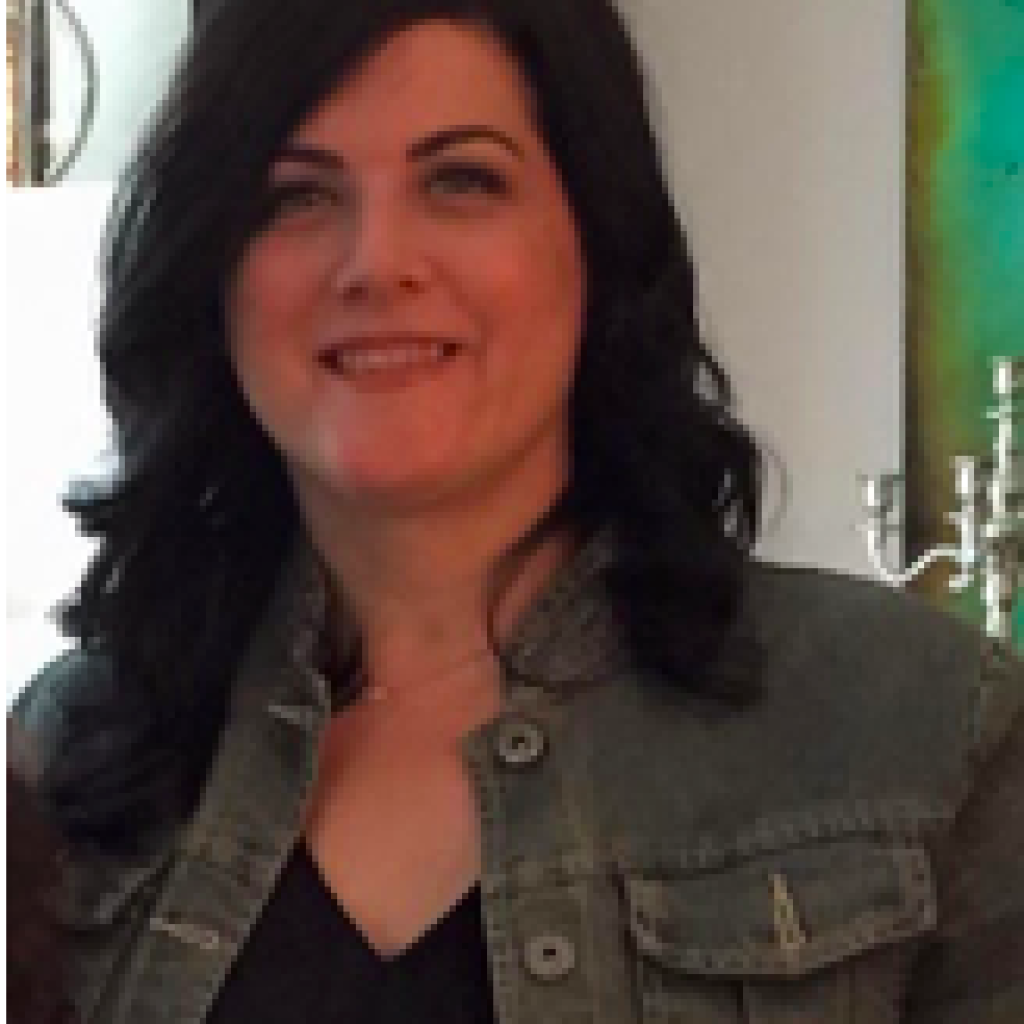
“Incorporating the Mentoring of Undergraduate Research into your Professional Portfolio”: A Panel & Workshop Sponsored by the Council on Undergraduate Research (CUR)
Facilitated by CUR’s Susan Larson, Trent Maurer, Paul Miller, and Brad Wuetherick
As undergraduate research (UR) grows in prominence across higher education, institutions of all types are seeking ways to successfully enhance UR programs. During this workshop, panelists from different institutional types and across the globe will share models and best practices of incorporating undergraduate research into professional portfolios, including teaching, research and service. Participants will have the opportunity to discuss systematic approaches that departments can take to scaffold research skills and experiences into the curriculum and individual approaches that a faculty member might use to make research (including their own) accessible to students in their courses. Best practices for mentoring UR, strategies to assess effectiveness and impact, and integration of UR into workload will also be discussed. Participants will have time to develop an action plan for integrating research into their professional lives or for leading faculty through the process of developing UR experiences.
This workshop is sponsored by the Council on Undergraduate Research, whose mission is to support and promote high-quality undergraduate student-faculty collaborative research and scholarship. Workshop conveners, Susan Larson, Trent Maurer and Paul Miller, will work with international panelists in the development of this workshop.
Susan Larson is currently Division Chair for Sciences and Mathematics and Professor of Psychology at Concordia College in Moorhead MN. She served as Concordia’s director of undergraduate research from 2009-2015 and serves as the 2016-2017 President of the Council on Undergraduate Research. An experienced leader of faculty professional development workshops, she has helped to coach more than 20 institutions in undergraduate research program development and best practices over the last decade.
Trent Maurer is a Professor of Child & Family Development and Director of the School of Human Ecology Undergraduate Research Program at Georgia Southern University. He teaches courses in Family Science, Child Development, and the University Honors Program. His most recent SoTL scholarship focuses on issues in shared authorship credit and student learning from collaborative research experiences. He currently chairs the ISSOTL Advancing Undergraduate Research Interest Group.
Paul Miller is the assistant provost for operations and communications at Elon University and a Professor of Exercise Science. He was the director of the Undergraduate Research Program at Elon from 2009-2017. He was the founding chair of CUR’s Health Sciences Division and served on the CUR executive board from 2010-2013. His scholarly interests include investigation of the impact of nutritional strategies on muscle function and recovery; and undergraduate research mentoring. He co-led a multi-institutional, international research seminar on Excellence in Mentoring Undergraduate Research with Elon’s Center for Engaged Learning from 2013-2016.
Brad Wuetherick is the Executive Director, Learning and Teaching in the Office of the Provost and VP Academic and Centre for Learning and Teaching at Dalhousie University in Halifax, NS, Canada. Brad’s research has focused on both undergraduate research and the scholarship of teaching and learning, in addition to work related to academic development, faculty attitudes towards teaching and learning, and change processes in higher education.

CONTACT AND CONNECT
ISSOTL17 is co-hosted by the University of Calgary and Mount Royal University, and the Conference Co-Chairs are Nancy Chick and Michelle Yeo. Questions? Email issotl2017@issotl.com.
Follow conference preparations, announcements, activities, and highlights below:
- The ISSOTL website (the ISSOTL17 page)
- Twitter (@ISSOTL17, #ISSOTL17)
- Facebook (the ISSOTL17 event)
- ISSOTL members’ listserv (If you’re not a member, you may join or renew your membership here.)

